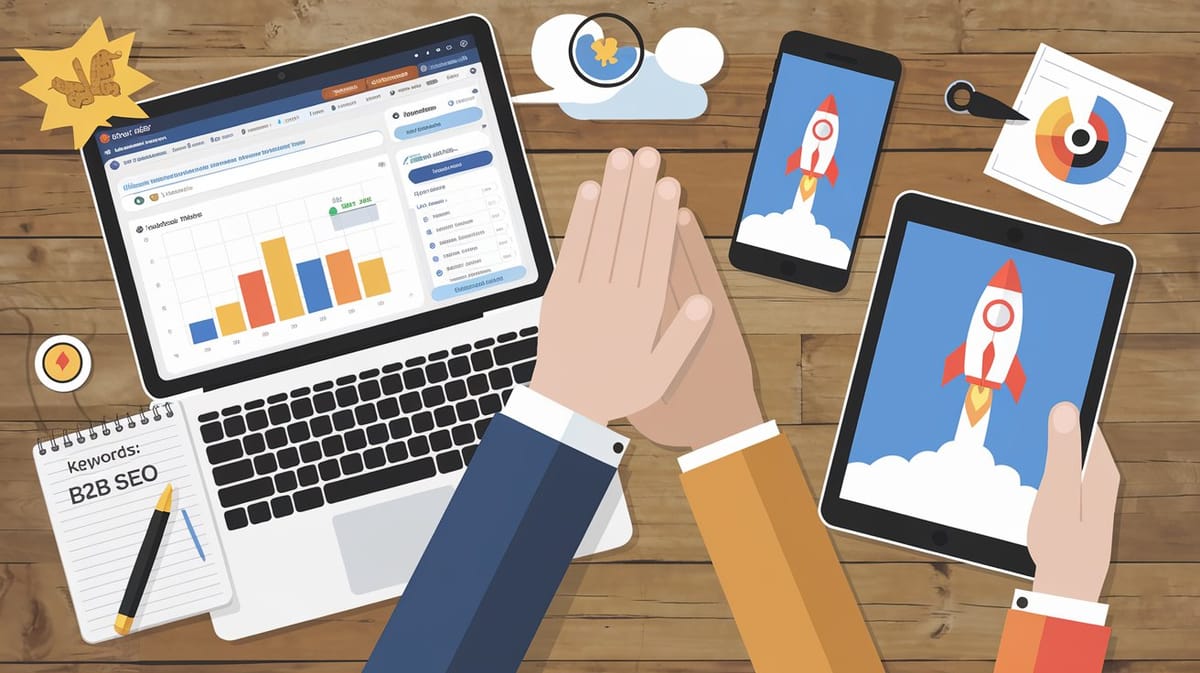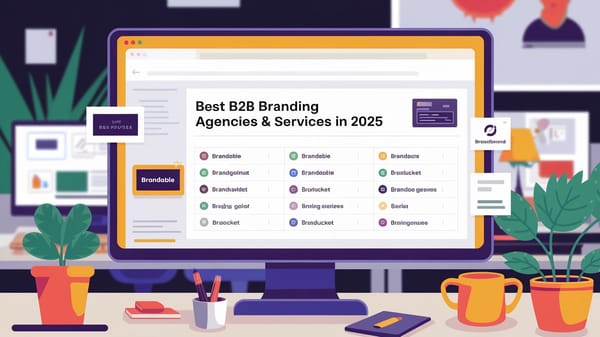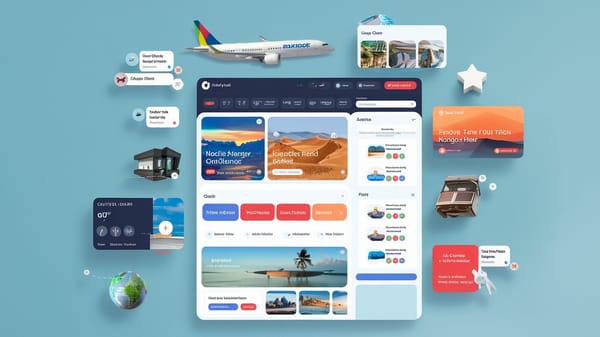The World's Most Specialized B2B SaaS Marketing Tools

As businesses increasingly transition to cloud-based solutions, the competition within the SaaS sector intensifies, necessitating innovative marketing strategies to capture and retain market share. According to Statista, the global B2B SaaS market is projected to reach $307.3 billion by 2027, underscoring the growing demand for these solutions.
The B2B SaaS industry is characterized by its unique dynamics, which distinguish it from B2C marketing. Unlike B2C, which often targets individual consumers with emotional appeals, B2B marketing focuses on businesses and organizations, requiring a more analytical and relationship-driven approach.
To navigate these challenges, B2B SaaS companies are increasingly leveraging advanced marketing tools that integrate cutting-edge technologies such as Artificial Intelligence (AI) and Machine Learning (ML). These technologies are revolutionizing digital marketing strategies by enabling companies to understand customer behavior, predict future actions, and personalize marketing efforts.
You can also visit Oncely.com to find more Top Trending AI Tools. Oncely partners with software developers and companies to present exclusive deals on their products. One unique aspect of Oncely is its “Lifetime Access” feature, where customers can purchase a product once and gain ongoing access to it without any recurring fees. Oncely also provides a 60-day money-back guarantee on most purchases, allowing customers to try out the products and services risk-free.
Oncely are hunting for the most fantastic AI & Software lifetime deals like the ones below or their alternatives:

Table of Contents
- Emerging Trends in B2B SaaS Marketing for 2023
-
- Personalization and AI-Driven Insights
-
- Integration of Account-Based Marketing (ABM)
-
- Emphasis on Customer Experience (CX)
-
- Rise of Data Privacy and Compliance
-
- Expansion of Multi-Channel Marketing Strategies
-
- Key Strategies for Effective B2B SaaS Marketing
-
- Understanding the Unique Nature of B2B SaaS Marketing
-
- Leveraging SEO and Content Marketing
-
- Building Strong Customer Advocacy
-
- Emphasizing Integration Capabilities
-
- Adapting to a Long Sales Cycle
-
- Leveraging AI and Automation in B2B SaaS Marketing
- AI-Driven Customer Insights and Personalization
- Automation of Marketing Processes
- Integration of Generative AI
- Enhancing Customer Experience with AI
- Challenges and Considerations in AI Adoption
Emerging Trends in B2B SaaS Marketing for 2023
1. Personalization and AI-Driven Insights
In 2023, personalization in B2B SaaS marketing has become increasingly sophisticated, driven by advancements in artificial intelligence (AI) and machine learning. These technologies enable marketers to analyze vast amounts of data to deliver highly personalized experiences to their clients. AI tools can segment audiences more effectively, predict customer behavior, and tailor marketing messages to individual preferences. According to a Gartner report, 75% of B2B SaaS marketers are expected to use AI for personalization by 2025, highlighting the growing importance of this trend.
AI-driven insights also facilitate the creation of dynamic content that adapts in real-time based on user interactions. This level of personalization not only enhances user engagement but also improves conversion rates. For instance, companies like HubSpot and Salesforce have integrated AI capabilities into their platforms to offer personalized recommendations and insights, thereby enhancing the customer journey.
2. Integration of Account-Based Marketing (ABM)
Account-Based Marketing (ABM) continues to gain traction in the B2B SaaS sector as companies seek to target high-value accounts with precision. ABM strategies involve tailoring marketing efforts to specific accounts, often using a combination of personalized content, targeted advertising, and direct engagement. According to a Forrester study, companies that have implemented ABM strategies report a 30% increase in revenue compared to those that have not.
The integration of ABM with SaaS platforms allows for seamless coordination between marketing and sales teams, ensuring that both are aligned in their efforts to engage target accounts. Tools like Marketo and Demandbase have enhanced their ABM capabilities, offering features such as account-level analytics and personalized content delivery. This integration helps in building stronger relationships with key accounts and accelerates the sales cycle.
3. Emphasis on Customer Experience (CX)
In 2023, the focus on customer experience (CX) has become a critical differentiator for B2B SaaS companies. As competition intensifies, businesses are prioritizing CX to retain customers and drive growth. A PwC survey found that 73% of B2B buyers consider customer experience a key factor in their purchasing decisions.
SaaS companies are leveraging technology to enhance CX by providing seamless onboarding processes, intuitive user interfaces, and responsive customer support. Platforms like Zendesk and Intercom are leading the way by offering comprehensive CX solutions that include chatbots, automated support, and customer feedback tools. These features help businesses to quickly address customer issues, gather insights, and continuously improve their offerings.
4. Rise of Data Privacy and Compliance
With increasing concerns over data privacy, B2B SaaS companies are prioritizing compliance with regulations such as the General Data Protection Regulation (GDPR) and the California Consumer Privacy Act (CCPA). Ensuring data privacy is not only a legal obligation but also a competitive advantage, as customers are more likely to trust companies that demonstrate a commitment to protecting their data.
In 2023, SaaS providers are investing in robust security measures and transparent data practices. According to a Deloitte report, 60% of B2B SaaS companies have increased their spending on data privacy initiatives. Tools like OneTrust and TrustArc offer comprehensive solutions for managing data privacy and compliance, helping businesses to build trust with their clients and avoid costly penalties.
5. Expansion of Multi-Channel Marketing Strategies
The expansion of multi-channel marketing strategies is another significant trend in the B2B SaaS landscape. Companies are leveraging a variety of channels, including social media, email, webinars, and content marketing, to reach their target audiences. This approach allows businesses to engage with prospects at different stages of the buyer's journey and provides multiple touchpoints for interaction.
A HubSpot report indicates that 67% of B2B marketers are using multi-channel strategies to improve their reach and engagement. SaaS platforms like Hootsuite and Buffer are facilitating this trend by offering tools that enable marketers to manage and analyze their campaigns across multiple channels. By adopting a multi-channel approach, B2B SaaS companies can increase their visibility, generate more leads, and ultimately drive higher conversion rates.
Key Strategies for Effective B2B SaaS Marketing
1. Understanding the Unique Nature of B2B SaaS Marketing
B2B SaaS marketing is distinct due to its focus on selling intangible products to businesses rather than individual consumers. This requires marketers to effectively communicate the value and utility of their software solutions in a way that resonates with business decision-makers. The complexity of these products often necessitates a detailed explanation of features and benefits, which must be balanced with simplicity to ensure clarity for potential users (Stratabeat).
The target audience in B2B SaaS marketing is typically composed of businesses, which means the scale of purchases is larger and involves multiple stakeholders. This necessitates a marketing approach that addresses the needs and concerns of various decision-makers within an organization (Hawksem).
2. Leveraging SEO and Content Marketing
Search Engine Optimization (SEO) is a cornerstone strategy for B2B SaaS marketing. It involves optimizing website content to rank higher in search engine results, thereby increasing visibility to potential clients. According to studies by HubSpot, organic traffic converts at a rate of 15.04%, significantly higher than the 2.49% conversion rate for paid traffic (Kdan). This highlights the importance of crafting content that is not only keyword-rich but also valuable and informative to the target audience.
Content marketing complements SEO by providing valuable information that helps potential customers understand the benefits of the SaaS product. This can include blog posts, whitepapers, case studies, and webinars that demonstrate expertise and build trust with the audience (GoSquared).
3. Building Strong Customer Advocacy
Customer advocacy is a powerful strategy in B2B SaaS marketing. Satisfied customers can become brand ambassadors, providing authentic endorsements that resonate with potential buyers. This form of word-of-mouth marketing is particularly effective because it comes from trusted sources who have firsthand experience with the product (Hawksem).
Encouraging customer advocacy involves nurturing relationships with existing clients and providing them with exceptional service and support. This not only increases customer satisfaction but also enhances the likelihood of referrals, which can serve as a significant lead generation channel.
4. Emphasizing Integration Capabilities
For B2B SaaS products, seamless integration with existing technologies is crucial. Decision-makers often evaluate how well a new solution can integrate with their current systems and infrastructure. This capability can significantly impact the adoption of the product within an organization (Stratabeat).
SaaS marketers should address integration capabilities in their messaging, highlighting how their product can work with other technologies and support common integration standards. This can alleviate potential concerns and position the product as a viable solution that enhances operational efficiency.
5. Adapting to a Long Sales Cycle
The sales cycle in B2B SaaS marketing is typically longer than in B2C due to the involvement of multiple stakeholders and the complexity of the purchasing decision. This requires a strategic approach that nurtures leads through the buyer's journey, providing them with the information and support they need at each stage (Hawksem).
Effective strategies for managing a long sales cycle include personalized communication, targeted content, and regular follow-ups. By maintaining engagement and addressing the specific needs of each stakeholder, marketers can build relationships and guide prospects toward a purchasing decision.
In summary, effective B2B SaaS marketing requires a deep understanding of the unique challenges and opportunities within this space. By leveraging strategies such as SEO, content marketing, customer advocacy, integration capabilities, and adapting to a long sales cycle, marketers can effectively position their products and drive business growth.
Leveraging AI and Automation in B2B SaaS Marketing
AI-Driven Customer Insights and Personalization
Artificial Intelligence (AI) is revolutionizing B2B SaaS marketing by providing deep customer insights and enabling personalized marketing strategies. AI tools can analyze vast amounts of data to create a 360-degree view of customers, segment audiences, and predict customer behavior. For instance, Salesforce's Einstein AI uses predictive lead scoring to identify which leads are most likely to convert, allowing sales teams to focus their efforts on high-potential prospects (Delve AI). This capability not only enhances targeting precision but also personalizes customer interactions across all touchpoints, thereby improving conversion rates and customer satisfaction.
Automation of Marketing Processes
Automation is a critical component of modern B2B SaaS marketing, streamlining operations and reducing manual workload. AI-powered marketing automation tools can handle repetitive tasks such as email marketing, social media posting, and lead nurturing, freeing up marketers to focus on strategic initiatives. These tools also enable real-time product recommendations and content generation, enhancing the efficiency and effectiveness of marketing campaigns (Altitude Marketing). By automating these processes, companies can achieve significant cost savings and improve their return on investment.
Integration of Generative AI
Generative AI (GenAI) is emerging as a transformative force in B2B SaaS marketing, offering new ways to create content and engage with customers. GenAI tools can generate personalized content assets, such as emails and social media posts, tailored to individual customer preferences and behaviors. This level of personalization is crucial in today's competitive market, where customers expect relevant and timely interactions (Medium). Moreover, GenAI can provide just-in-time market insights, helping marketers make informed decisions and adapt quickly to changing market conditions.
Enhancing Customer Experience with AI
AI technologies are enhancing the customer experience by enabling more efficient and effective interactions. Chatbots, powered by AI, can engage users in real-time, providing instant support and information. This not only improves customer satisfaction but also reduces the burden on customer service teams. Additionally, AI can analyze customer feedback and behavior to identify areas for improvement, allowing companies to continuously refine their offerings and enhance the overall customer experience (NxtStep).
Challenges and Considerations in AI Adoption
While AI and automation offer numerous benefits, their implementation in B2B SaaS marketing is not without challenges. Companies must navigate issues such as data privacy concerns, the need for skilled personnel, and the integration of AI tools with existing systems. Successful AI adoption requires collaboration across departments, including HR, legal, IT, and marketing, to ensure that AI tools are used responsibly and effectively (Delve AI). Organizations must also be willing to experiment and learn from failures, as AI initiatives may not yield immediate results.
In conclusion, leveraging AI and automation in B2B SaaS marketing can drive significant improvements in efficiency, personalization, and customer engagement. However, companies must carefully consider the challenges and invest in the necessary resources to fully realize the potential of these technologies.





